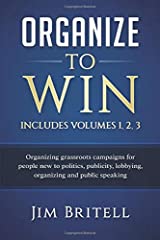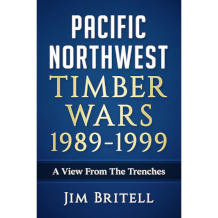
“Jim is one of the best grassroots leaders I have ever known, his books are required reading for all grassroots activists.”
– Brock Evans, retired VP National Audubon; head lobbyist Sierra Club; President of Endangered Species Coalition
“Jim Britell brought East Coast political street smarts to the Northwest ancient forest campaign.”
– Kathy Durbin, Tree Huggers: Victory, Defeat & Renewal in the Northwest Ancient Forest Campaign
“I have met literally thousands of grassroots activists. Jim Britell stands head and shoulders above the crowd.”
– Mark Dowie, author of Losing Ground, American Environmentalism at the Close of the Twentieth Century
Books
A veteran of over 100 grassroots campaigns Jim shares his experience in his books.
Organize to Win print edition, includes volumes 1-3. 463pp, $16.59

Lessons from hundreds of grassroots campaigns. A step-by-step guide to making change. Jim Britell, environmental activist and political organizer, shares what he has learned during 30 years helping local groups to organize and run effective campaigns.Organize To Win is a series of three books that distill lessons from hundreds of grassroots campaigns to show how anyone can stop bad projects. These guides lead you step-by-step through the minefields citizens, who try to effect change in their communities, must navigate.
Leading a successful grassroots campaign involves organizing people, holding meetings, writing letters, being interviewed, and negotiating with trained professionals and lawyers. You will be advocating in regulatory and political settings that your opponents have mastered. These books will teach you lessons learned from hundreds of campaigns in which ordinary people protected old growth forests, stopped destructive gold mining, prevented giveaways of public land, and halted proposed landfills.
Pacific Northwest Timber Wars 1989-1999, 169pp, $13.00

In books and articles about this conflict, Kalmiopsis Audubon was often singled out as one of the leaders in the fight to save the forests because we were the primary environmental group in a remote region that contained hundreds of thousands of acres of intact old growth and ancient forest. In the late 1980s, in just our region, hundreds of clearcut timber sales were in the queue, in various phases of preparation, up to and including trees tagged for clearcut, sale boundaries marked, timber auctions scheduled and even bids awarded. But today, nearly all of this old growth is still untouched and planned sales were cancelled or withdrawn, and much of the area was withdrawn from future logging.
These writings demonstrate the hard-hitting completed staff work that an independent volunteer local group is capable of producing and which is always the fundament of successful local activism. They give insight into the emotional roller coaster of day-to-day environmental advocacy. And they illustrate the range of issues a fully engaged, multi-issue, local group can encounter when people pay attention to what goes on behind the scenes in their community. Any group, in any town, in any state would find comparable numbers and ranges of issues that cry out for action if they but looked.
Popular Articles
Bob Marshall’s Long-Lost Arguments For Wilderness
The original ideas and arguments organizers used to create roadless wilderness were created by New York’s Bob Marshall. All our ideas about the value of wilderness began with him. If we ever have to mobilize to save public lands, or if we want to create more of it we need to revisit his arguments that motivated the country to acquire it in the first place. Unfortunately, in the last 50 years many of his arguments have been lost and forgotten, but they worked well once and will work again if we can recover and reintroduce them into the next generation’s advocacy conversation.
People and Books With Good Advice
Many of the issues we face today have been issues for human organizations for thousands of years. About 4500 years ago, Egypt’s pharaohs set up formal training classes for children of high officials expected to become their future vizers and overseers. Lessons from these classes have survived on clay tablets1 and contain much good management common sense. One was, for example, if someone comes to you complaining, let them say everything they have to say and “noddelth to his addresses until he hath made an end of that about which he came…A favorable audience gladdeneth the heart.” In other words, if you are a boss, and someone comes complaining to you, always listen attentively but you don’t necessarily have to do anything about the complaint for the petitioner to feel better.
In 1972 Alinsky explained why a Trump would rise in the US and how to defeat him
In his description of what he feared America would become, Alinsky said the middle class would become apathetic and terrorized by crime, baffled by computerization, alienated, and feel rejected and hopeless. Lacking the ability to participate in the political process, they would become terminally disillusioned. In this state, they would tend towards fascism or radical change. In a bewildered and frightened state, they would grope for alternatives, their impotence and paranoia “…making them ripe for the plucking by some guy on horseback promising a return to the vanished verities of yesterday.”
Why Some Grassroots Campaigns Succeed And Others Fail
Most campaigns Today don’t do any of the things successful grassroots leaders of the past said you must always do, while doing all the things they said you mustn’t. But all of their tools and guides are always embedded in a few foundational principles which are indispensable in any campaign which seeks a long-term impact.
Misconceptions About Lobbying Representatives and Agencies
Never overestimate the knowledge, intelligence, or courage of elected representatives. When a really good politician does a bad thing, there are four things activists should do:
- Ask them to explain exactly why they did it.
- Tell them you are very disappointed.
- Ask them not to do it again.
- Forget it.